We got in touch with Jae Matthews and Gus Muller of the moody duo Boy Harsher at their home in Northampton, Massachusetts while they caught a breath from relentlessly touring. The region also provides the setting for the majority of their most recent project, body-horror film The Runner, released this past January along with an accompanying original soundtrack.
The film follows a woman with carnal, violent instincts as she navigates the treacherous, emotional, wooded terrain surrounding the band’s home turf, and is based around characters that the band has been exploring in various elements of their work for years now.
Boy Harsher has conquered major hurdles in order to see The Runner into the world. Just as the pandemic closed in, Jae was diagnosed with multiple sclerosis, leaving her partner Gus to creatively explore how their band might look or sound when the two couldn’t work together.
Perhaps The Runner represents an overdue pause for the band who, since their inception in 2015, have had a non-stop approach to playing live in support of their albums, and they have the growing fan base to prove it.
We talked with the duo about the emotional depths and challenges they had to navigate to complete the film and album, how they resulted in the fog-drenched frames of The Runner, how horror is more terrifying when the threat lies within, and the perils of independent filmmaking.
Read the full Q&A after the jump!
�
I know you both know this is for a queer website, so to make up for the fact that you’re in a hetero-couple we’re just gonna talk about the new Beyonce record the whole time. Hopefully that’s okay!
Jae: We were so flattered that you wanted to talk to us. I get the impression people sometimes assume I’m a hundred percent lez, and I’m just partially partially lez— so i’ll try not to take up too much space!
We will have to figure out all the percentages later. It’s funny people assume that about you! A friend of mine was surprised recently to find out the two of you were in a relationship, having assumed Gus was super gay! So I guess you should capitalize on that in terms of growing your audience. Get those gay numbers!
Oh yeah. We’re all about the numbers!
Your first official Boy Harsher film production, The Runner, was released last January, and you’re touring the accompanying soundtrack now. You’ve always maintained a very intense touring schedule— it’s sort of shocking that you managed to find time to execute an entire film since your last album, Careful, came out in 2019. Are you masochists?
Gus: I mean, that’s why we got into music, because we wanted to travel. Like we were booking shows in Savannah and meeting lots of touring musicians and we were just like, wait, we want to try that. We wanna go out there and meet like lots of crazy freaky people and play weird shows. So yeah, at the beginning we’d hop in the car for anything and drive literally anywhere to play shows.
Jae: Yeah. We’ve possibly played like the world’s worst tours for years, but the sweetest thing about it is, it is absolutely magical for us, just to have this opportunity to play our music in some gross basement, somewhere in like, Wichita and making that connection is like, “Wow, this is so cool.”
It’s way different now! I think the thing that makes everything so strange is as soon as you start leveling into some areas of success, touring becomes really different. I mean, we love doing it, but we are definitely exhausted. I think you’re allowed to have those two experiences; you know, it’s not mutually exclusive.
Your songs and shows can be really intense. How do you navigate maintaining that intensity with a rapidly growing audience?
Jae: I think the bigger challenge, which speaks more towards like just presentations, is that we’re very specific about our live show. We want it to hit in a certain way, and you want the audience to experience certain peaks and valleys, and the latest release that we made, even though it’s like one of our favorites, is not necessarily like a tour-exclusive album.
Two of the songs have vocal features, a lot of the songs are more cinematic and score-like. So I think that the bigger challenge with this year of touring in particular was kind of building the live set and picking from our roster: which songs felt really cool together and really ripping.
We’re all about a high energy show. Like maybe someday, in ten years or something, we’ll play like the mellow hits, but right now it’s all about the rips.
So how did you find that balance between presenting the new stuff and the “hits”?
Gus: Well, it’s just two different worlds. We were playing these songs live and we just saw which songs were getting the best reactions from audiences. In a way it was also a sort of a defense mechanism in those scenarios where we would be on bills with other bands or audiences and we would play super noisy, harsh set, because it was like our way of just sort of taking control…
Jae: Yeah. I mean from the very beginning, like the earliest Boy Harsher shows, we were on bills of us playing against a lot of super harsh noise acts. I remember feeling the pressure that I have to do that too, except with my performance.
We’re not doing a wall of sound sort of approach to our music, so we are trying to match that intensity with the performance itself.
I noticed in your press kit that you refer to your sound as “dark pop”. Have you been purposely using words like “pop” to distance yourselves from the whole “dark wave” “cold wave” scene hype?
Gus: I mean, yeah, there’s a couple things going on there. I think when we changed our name to Boy Harsher from Teen Dreams, that’s when we started making what would be called pop music, with more structured songs, vocals, and something that you could sing along with too.
I’m totally fine with terms like “dark wave” and I’m happy when other people use it, but for me to use it, it feels pretentious. I remember talking to someone who wasn’t familiar with our music, asking about what genre it was, and I said “dark wave” one time and then I just hated myself after that. Just being like,”Yeah… I’m not gonna say that anymore.”
Jae: Being very genre-aware is something that we have tried to distance ourselves from. You know?
Gus: I think it’s something for journalists to get into. That’s their job. And for us to try to pinpoint what our music is or what genre or placement it fits into, that’s not our responsibility.
Are you ever surprised by the growth of your audience and the variety of people connecting with your music, outside of that crew of people who probably came to your earlier shows via interest in those more obscure sub-genres?
Jae: Always surprised. It’s not only so surprising, but so humbling. And I will say that’s one thing that has kind of shifted for us in terms of audience. I’ve noticed now that the people who I felt like at times would be hypercritical of what we were doing, especially when we were playing in those smaller exclusive places, have kind of been replaced by younger people who are so eager and like it.
Oftentimes, I feel like we just get these inquiries like, “How did you guys begin? I wanna do this. How do I start?”
That, to me, is so cool.
That’s really cute! This might be weird, but are you ever defensive of your work when you see normals getting into it? Like people you may have distanced yourself from in other areas of your life coming out to your shows?
Jae: I wouldn’t say that because it might hurt people’s feelings, but like sometimes you play festivals in the middle of nowhere and you have like, maybe a little bit of a bro-ier contingent and that will bum me out.
But then, when I see some faces and they’re like, confused but intrigued, I’m like, “Okay, at least maybe I’m changing some ideas in there.”
It’s weird how art can locate this weird common ground with someone you might have thought of as an opponent. You don’t feel that sort of antiquated ’90s-era pressure to not “sell out” to the normals?
Jae: I think about that a lot too, but it feels like the reality now is everyone understands that musicians have to sell little chunks of their soul all the time, just in order to be functional.
In the ’90s, I totally remember that stigma where people would be like, “Oh, you sold your song or like commercially totally sold out,” but now people are like, “I hope that happens for you!” You know? Like, “I hope you can find your fortune. Good luck!”
It’s great to see that happen to cool bands. I know you’ve been writing around the idea of this character of “The Runner” for quite some time now—almost like a sort of muse. As you mentioned, the record has two guest features by Mariana Saldaña and Cooper B. Handy, who also write the lyrics for their own songs. With such a deep relationship to the story and character of The Runner, how did you come to develop interjecting these other voices into your story?
Gus: Well, when we were writing these songs, we did not have the foresight that we were gonna make a film. I mean, we were writing these songs in 2020 when we had no idea if we were gonna be touring again or when a record was gonna come out. It was just tough. My creativity was totally shot and I kind of needed something new to work on.
So, getting help from Mariaña and Cooper to help write a song was what I needed to motivate myself to make new material. And after those songs were completed, that’s when we started crafting the idea of the film to sort of tie it all together.
Jae: Those songs, too, in particular, the placement in the film, you can tell not that they’re secondary, but they are meant to be smaller pieces of like the bigger puzzle. Mariaña is the beautiful woman on the television singing “Machina” and then Cooper is at the end, during the credit sequence
Which is adorable. How did you decide to end the film on such a cute lighthearted outro?
Jae: I know. Is he not just like the cutest? It was really important for us to have that emotion, especially at the end there because the actual production was so much a family and deep friendship type of experience.
It was hard as hell. We were over-scheduled and out of time and it rained the whole five days. It was so crazy. We were with these people who we love so much and hopefully it’s mutual.
So, I think that really came out of wanting to match a little bit of the production experience, you know?
Working on independent films is never comfortable. It’s all about asking so many favors from friends and artists, It sounds fun at first, but then all of a sudden everyone’s cold and hungry and poor and you’re like, “Uh, we’re almost done,” but you’re not!
Jae: A point to why we only wanted to work with musicians. It felt really important. In casting, I was really going for people with good faces and interesting vibes, but who were also fellow musicians.
So, I think after like a couple hours, a lot people were like, “Wow. Music days are definitely shorter than film days.”
Speaking about the casting, there are so many really fun things happening there. For instance, James Duvall, who is probably best known from all his work with Gregg Araki, is in there as the talk show host guy in the show within the film. Was that a purposeful homage to his work as a ’90s icon?
Gus: It’s a major, major cameo! We just messaged him on Twitter and it turned out he was a fan of the band, so when we had that shoot out in L.A., it just lined up perfectly!
How did you establish your creative and production roles on set in terms of who worked with the actors or handled all the different elements of the production?
Jae: I would say that we weren’t that strict in our hierarchy, but going in, we did have a maybe naive, but positive hope that I would work with the actors, and Gus would work with our DP Dan Debrey, who’s great.
In the video segment for “Machina,” Mariaña appears on the television in a seemingly total aesthetic aside, complete with a bodybuilder posing while covered in head to toe metallic body paint? While I love you found space for humor in an otherwise fairly bleak movie, how did you decide on what that would look like without it being too random?
Gus: That we kind of came together pretty last minute, because in the script it just was like a couple lines like “a beautiful woman dances on the television screen…”
Jae: We’re really into this late latex fetish magazine called Skin Two, and they had this great spread with this woman wearing latex and screaming, and there’s a bunch of sparks around her. That’s when we decided this is what we wanted to do.
The Silver Man, honestly, that’s something that I really wanted to do. I really had this image of a bodybuilder kind of doing their routine by the beautiful woman.
That guy is so funny. He’s actually like the sweetest human in the world. He’s from North Carolina.
Nostalgia gets a bad rap, but do you find all horror people are intrinsically nostalgic?
Gus: I think nostalgia is just a trick to get a real gut feeling from something, you know, you have something that’s nostalgic and it just brings a whole bunch of context with it. So, it can pack something with a lot more feeling.
Jae: I guess the nostalgia horror stans are just obsessed with nostalgia, but maybe it does represent this world where kind of really horrific things can happen. Right? Like, possibilities are almost endless.
Oftentimes when I’m writing, I think about how it’s really hard to make something truly suspenseful. Our lives are anti-suspense. We cannot go a minute without being on our phone or constantly writing emails, or checking emails.
Life is a bombardment of being totally aware and totally in control, and maybe nostalgia really just represents a time where you didn’t have that awareness or control.
The film takes place between a seemingly sunny studio location of the band rehearsing, and the ominous mountainous region of the narrative of The Runner. Can you talk about the role the landscape plays in this movie?
Jae: Yeah, absolutely. So writing this film during isolation in Western Massachusetts, the landscape here is one that is represented very well in the film. It’s wooded. It can be incredibly desolate if you want it to and it’s very, very moody.
One thing that we really lucked out on with all that rain is that we were within an immense fog during the whole production. You can see it in a lot of the mountain shots or the driving through the wood shots.
We wrote it and then went out with a 50-mile radius, and tried to find the places that really evoked the same energy that was written into the script. And yeah, I went to basically every dive bar on this side of Massachusetts.
A very pivotal scene takes place in a very divey bar, which feels like a spiritual centre to the story. In the scene, The Runner encounters a group of people for the first time, and connects to men and women in very opposing ways where she strikes fear in men but has an uncanny unspoken connection with a woman at the bar. It gets pretty gay, but there’s a union that transcends sexuality between the two women. Can you talk a bit about the transformative nature of that space and the scene?
Jae: Well, that’s probably the most heartbreaking I’d say out of all of the connections within the film. The Runner has this violent tendency obviously, and within her it’s like something that’s often uncontrolled. And what I found with the scene is you really see the advent of how it begins.
It all starts by getting just a little bit of attention, a little bit of interest, and then suddenly she can no longer really control that impulse. Then, The Runner zones in on the lonely woman who’s played by Sigrid Lauren , who is this amazing performance artist based in New York. She is such a deeply intuitive person. It was interesting working with her because as a performance artist, she really handled everything in a really physical way. You know, it’s like, “How does my body react to this?” Which is funny for me cuz you know, I definitely don’t have that same relationship with my body.
Trying to break that down in an emotional way was great. It was an awesome challenge. Her and The Runner do have this connection, and we did that unadulterated eye contact with that deep zoom, and I think that is what makes it so tragic and really speaks to one of the themes about how when you participate in this type of self-sabotaging behavior, in the end, you can end up destroying actual kindness and connection that you have.
You hurt the ones you love the most!
Jae: Exactly. I think you go out really hoping that you can destroy yourself, and it just speaks to the fact that often you’re actually just gonna fuck over someone else.
Jae, in and around the creation of this project, you found out that you were quite sick. Did creating the body horror elements in the film help you creatively tangle out any of that experience on a personal level?
Jae: In the first year of COVID, before this movie idea was ever really a thing, I was diagnosed with multiple sclerosis, and initially the first thing is this feeling of mortality, which is really funny to attach to multiple sclerosis because people don’t really die from it anymore, which is awesome. It just impacts your nervous system in a really serious way, and I had to take a break and I think that’s part of the reason why at first we started working with vocal features because I had stepped away from the studio for a minute to just regroup and figure out what was going on.
It was truly an experience that gave me a massive perspective. Then relating it to body horror—I will be totally honest. It has always been my favorite genre of choice, especially horror. I’m fascinated. And maybe it’s like something that comes when you have a female body, um, because you’re expected to be objectified constantly, but then also a lot about our bodies.
It can be really disturbing being a woman who menstruates… the biological experience of horror is so much about what’s within being dragged out. I love this concept that that is how one experiences the world, that is how the trauma really shows up. It is when it has to be expelled from the body. You have these like crazy, just deeply gross experiences like menstruation or popping a baby out, but like…Cronenberg.
People always ask “what’s next” once you’ve completed a project like this, before letting you bask in it. But I wonder, did you face any challenges that you weren’t able to navigate as well as you wanted, or something you learned that you want to apply in a greater sense next time you make a film? On a personal level, in terms of your goals as artists foraying into that territory, is there something driving you to go deeper?
Gus: Yeah. I mean, I think we definitely fleshed out these characters a bunch with The Runner, but I think there’s still more to be told with them. So I think we’re gonna keep exploring them both in music and, and in film.
Jae: I mean, we can be hopeful about the future and I think that’s what The Runner gave us a little bit is just, it was an experiment that left us with so many strange kind of unsettled feelings that we wanna keep doing it. We kind of wanna keep working on films. And of course, Boy, Harsher is our everything. So we’ll continue working on that too.
— Q&A by Kevin Hegge (@theekevinhegge)
The Runner is available for streaming now. Watch the film and listen to the soundtrack.

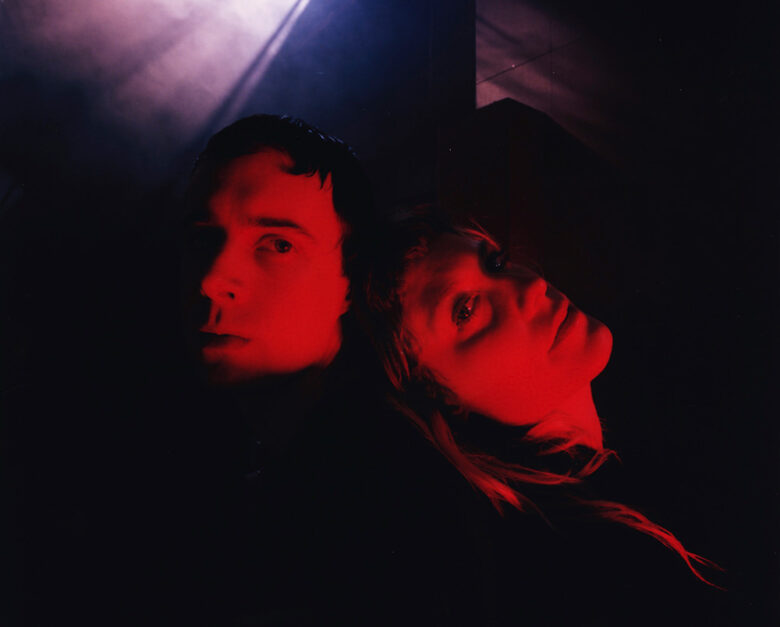
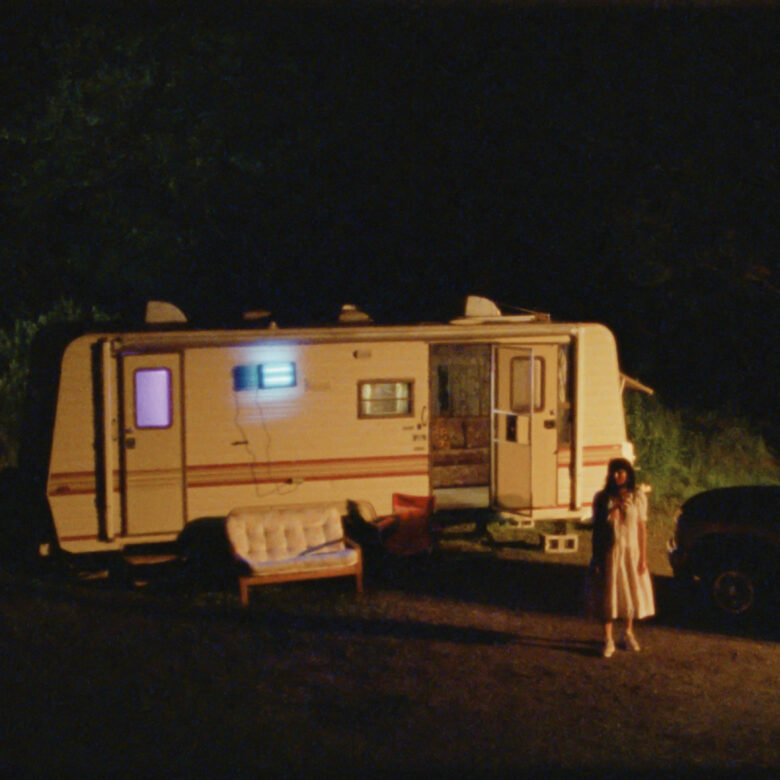
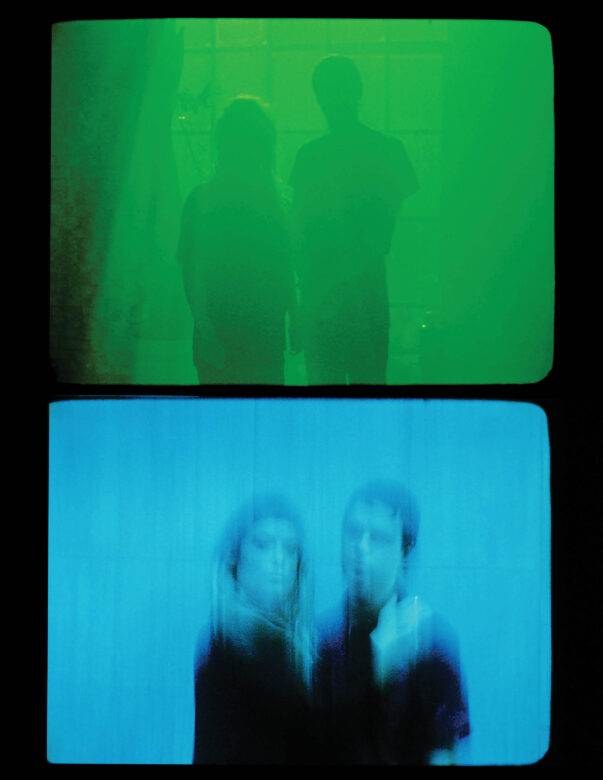
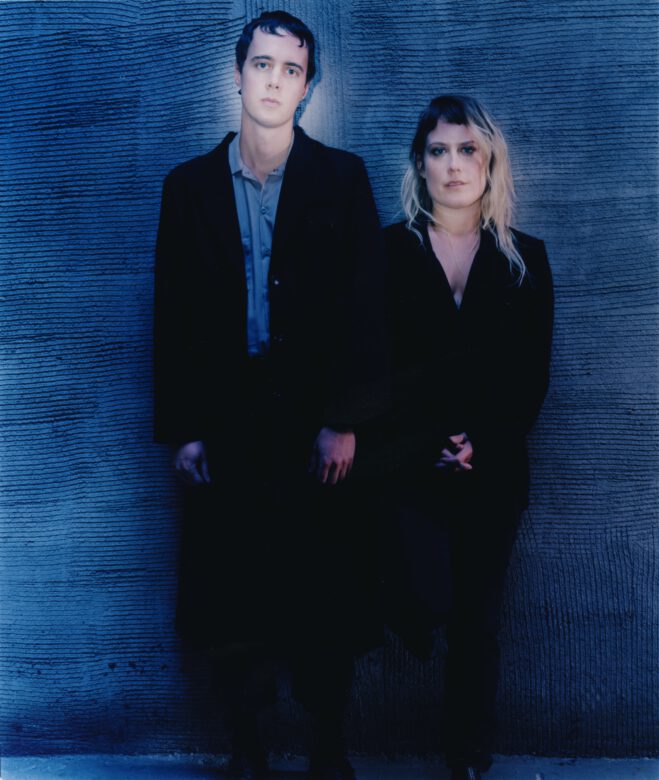
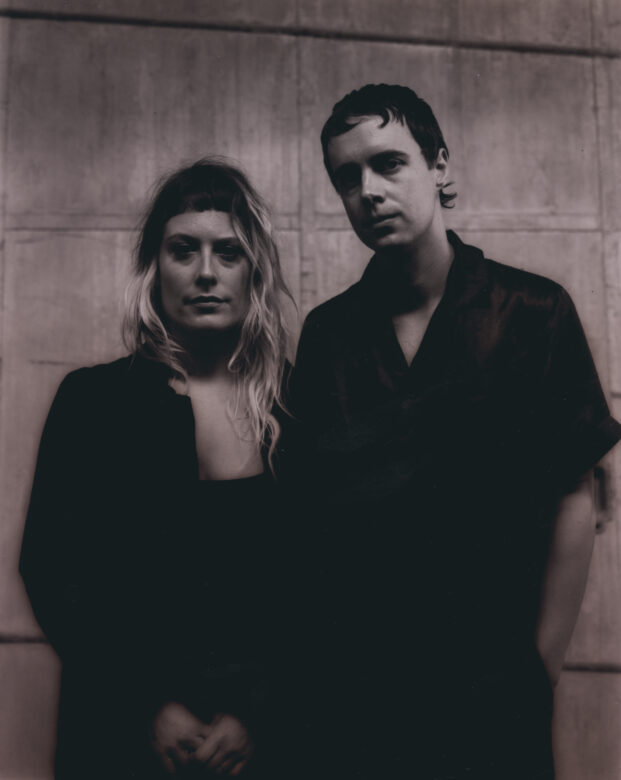
Be the first to comment on "OMG, a Q&A with Boy Harsher"